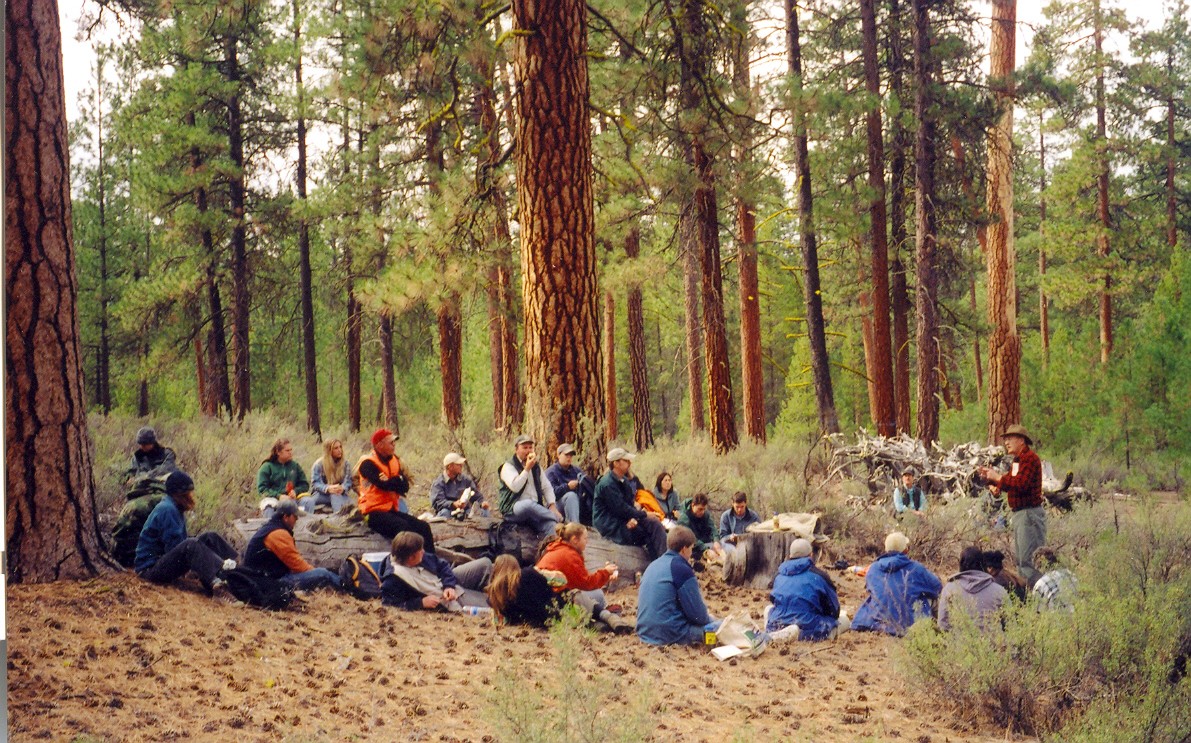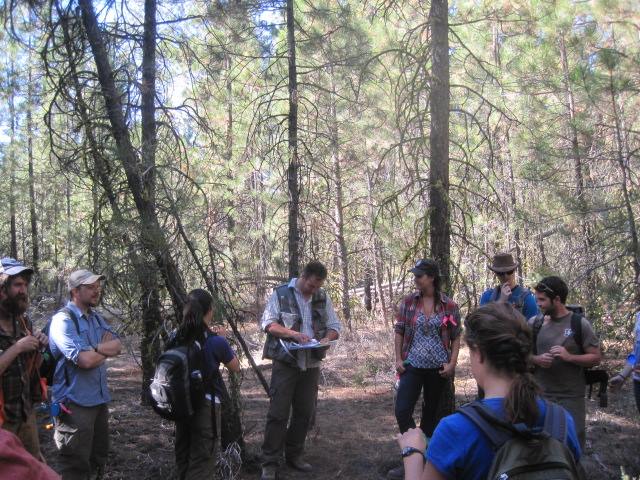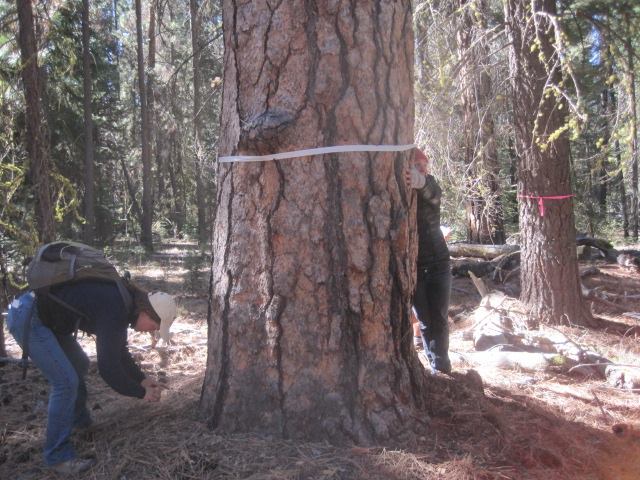Forestry & Environmental Science Education in the Pacific Northwest

Professor Jerry Franklin, far right, lectures a University of Washington class in a ponderosa pine forest in Oregon. Photo by Debbie Johnson.
If you’re interested in a career involving forest management, natural resources, or environmental science the Pacific Northwest has a wonderful range of higher education programs covering those topics. In fact, several NNRG staff have attended or are currently attending these programs. Below is a living list of higher education forestry and natural resource programs in the Pacific Northwest.
See something missing? Let us know at outreach@nnrg.org.
Central Washington University (Ellensburg, WA)
Bachelor of Science (BS) in Environmental Science
Evergreen State College (Olympia, WA)
Bachelor of Science (BS) or Bachelor of Arts (BA) in Ecology
Bachelor of Science (BS) or Bachelor of Arts (BA) in Natural Resource Management
Master of Environmental Studies (MES)
NNRG Lead Forester Jaal Mann completed the MES at Evergreen in 2014. Of the program, Jaal says, “I liked the broad focus of the MES program at Evergreen, because at the time I wasn’t sure exactly where I wanted to work. It was useful to learn about a wide variety of topics, and elective classes allowed me to dive more deeply into restoration and forestry. While Evergreen might not be the first option that comes to mind for someone who has a laser focus on a specific forestry career, it’s a good option for someone who wants to work in a natural resource or environmental field but isn’t sure exactly what they want to do — it gives great breadth of knowledge and experience which you can add to later with skills gained in the field, through internships, or through other educational programs.”
Grays Harbor College
Associates of Applied Science (AAS) – Forestry Technician
Bachelor of Applied Science (BAS) in Forest Resource Management
NNRG Forestry Technician Gustavo Segura Flores completed his Associates Degree in Natural Resources at Grays Harbor College in 2020 while also working part-time in a forest managed by the Grays Harbor College Forestry program. Gustavo is currently pursuing a Bachelors in Forest Resource Management at GHC, and has this to say: “The overall goal of the Grays Harbor Forestry Program is to provide hands-on experiences in a working forest. This goal is easily achieved thanks to the forest that has been actively managed by our instructor and the students of the program. It was a complete culture shock moving to such a heavily forested area coming from a traditional agricultural area. The time and experience I gained at the program have greatly increased my understanding of the culture and our industry. The biggest advantage of the program is being able to learn a broad range of skills which will in turn allow you to apply for a broader range of career opportunities.”
Green River College
Associates of Applied Science (AAS) in Natural Resources – Forestry
Associates of Applied Science (AAS) in Natural Resources – Geographic Information Systems
Associates of Applied Science (AAS) in Natural Resources – Park Management
Associates of Applied Science (AAS) in Natural Resources – Wildland Fire
Associates of Applied Science (AAS) in Natural Resources – Water Quality
Bachelor of Applied Science (BAS) in Natural Resources – Forest Resource Management
University Of Washington (Seattle, WA)
Bachelor of Science (BS) in Environmental Science & Terrestrial Resource Management
Bachelor of Arts (BA) in Environmental Studies
Master of Forest Resources (MFR) in Forest Management
Master of Environmental Horticulture (MEH)Master of Science (MS) in Environmental & Forest Sciences
NNRG Outreach Associate Alexandra Dolk is completing her MS in Environmental and Forest Sciences at the University of Washington and has this to say about the program: “Despite the size of the overall student population at the UW, my forestry classes at the UW School of Environmental and Forest Sciences (SEFS) are small, and individual students are given a lot of attention. The core requirements of the program provide an excellent foundation of ecological knowledge mixed with quantitative skills, and I’ve been able to apply what I learned in my graduate level classes to my thesis research.”
Washington State University (Pullman, WA)
Master of Science (MS) in Environmental Science
Master of Science (MS) in Natural Resource Science
PhD in Environmental and Natural Resource Sciences
Western Washington University (Bellingham, WA)
Bachelor of Science (BS) in Environmental Science
Bachelor of Arts (BA) in Environmental Studies
Master of Science (MS) in Environmental Science
University Of Oregon (Eugene, OR)
Master of Arts (MA), Bachelor of Science (BS), or PhD in Environmental Studies
Oregon State University (Corvallis, OR)
Master of Forestry (MF), Master of Science (MS), or PhD in Forest Ecosystems & Society
Master of Forestry (MF), Master of Science (MS), or PhD in Sustainable Forest Management
Master of Science (MS) or PhD in Wood Science
Master of Natural Resources (MNR)
Graduate Certificates | Sustainable Natural Resources, Urban Forestry, Forests and Climate Change
University Of Idaho (Moscow, ID)
Bachelor of Science (BS) in Forestry
Bachelor of Science (BS) in Forest and Sustainable Products
Master of Natural Resources (MNR)
Master of Science (MS) in Natural Resources
Master of Science (MS) in Environmental Science
PhD in Natural Resources
PhD in Environmental Science


Forestry students from the University of Washington practice forest inventory measurements during a 2-week field course.

Leave a Reply